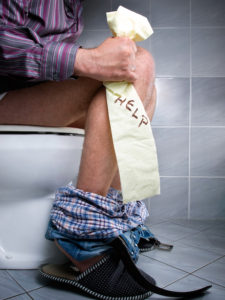Constipation

Not being able to go to the bathroom is frustrating, uncomfortable and sometimes painful. Most people experience some difficulties with bowel habits from time to time; however, constipation may be an ongoing problem for some. If you can’t go or if you have painful bowel movements, it might be time to talk to your doctor.
People have a wide variety of healthy bowel movement patterns; with some needing to go three times a day, while others go three times a week. In general constipation can be described as having the inability to have regular, comfortable bowel movements.
Symptoms
Constipation is a condition in which you typically have:
- Fewer than three bowel movements a week
- Uncomfortable or painful bowel movements with hard, dry or small stools
You could also be constipated if you:
- Strain to have a bowel movement
- Feel that everything didn’t come out
- Have a swollen belly or abdominal pain
Causes
Constipation occurs when undigestible waste moves too slowly through the digestive tract.
Common causes of constipation could be:
- Insufficient fiber in diet
- Not drinking enough water
- Dairy products
- Physical inactivity
- Some medicines
- Aluminum based antacids
- Narcotics and opiod drugs for pain, including oxycodone, codeine, hydromophone
- Antidepressants
- Anti seizure medication
- Anticholinergics such as bladder control medications
- Some blood pressure medications
- Diuretics
- Cold medicines—antihistamines and pseudoephedrine
- Vitamins containing iron
- Lifestyle changes
- Travel
- Pregnancy
- Aging
- Mechanical problems with passage of stood such as pelvic floor dysfunction, strictures or blockages
- Diseases and conditions
- Irritable bowel syndrome
- Multiple sclerosis
- Parkinson’s disease
- Any disease that leads to immobility
- Diabetes
- Thyroid disorders
- Muscle disorders
The history of bowel habits preceding the current problem is very important. Dramatic changes in bowel habits may signal a serious problem and should be investigated. Colon cancer may present with changes in bowel habits interpreted as constipation.
Diagnosis
Your doctor can diagnose constipation by:
- Taking a medical history
- Performing a physical exam
- Performing diagnostic tests such as a colonoscopy
Treatment
Treatment for constipation depends on the cause, severity and length of constipation. After a thorough exam, your doctor may recommend:
Dietary changes Sometimes constipation can be helped with a few changes in the diet.
- Increase water intake When you don’t drink enough water, your body tries to draw more water from the bowels, causing stools to become hard and dry. Drinking more water can alleviate constipation by adding more water in the bowel to keep stools soft and easy to pass.
- Increase Dietary Fiber Fiber is the part of the fruits, vegetables and grains and legumes that cannot be digested by the human digestive system. Insoluble fiber helps in the bowel by absorbing water and pushing waste through the digestive tract. It is recommended that adults consume 25-35 grams per day. Consciously adding fiber to your diet can not only help digestion, but can provide other health benefits. Click here to learn more about a high dietary fiber diet.
Lifestyle changes
- Move more! Making exercise a part of your daily routine helps relieve constipation.
- Don’t wait! As soon as the urge strikes, you should get to the bathroom.
- Stick to a routine. Eating stimulates your colon to move. Ensure that ample time after eating is allowed to have a bowel movement. Most patients find it helpful to use the bathroom at the same time each day, such as shortly after breakfast,
Medications When dietary fiber is not helping there are several alternatives that your physician may suggest. The optimal choices are those that are inexpensive, safe over time, and can be sustained.
There are many available fiber options available over the counter. Some people will not tolerate fiber but most simply don’t take enough. Fiber must be taken regularly to keep working. Twelve grams of fiber is usually enough to bring about a change in bowel consistency and frequency.
- Bulk-forming agents These supplements work by soaking up the fluid in the gut, making stools bulkier and easier to pass. While they may cause bloating and abdominal discomfort, drinking plenty of fluid can ease those symptoms. You should start with smaller doses, increasing until regular bowel movements occur. Common product names include:
- Benefiber—wheat dextrin
- Metamucil, Konsul, Serutan—psyllium seed
- FiberCon—polycarbophil
- Citrucel—methylcullulose
- Osmotic agents are laxatives that increase the amount of water retained within the colon, resulting in a softer stool. While they are available over the counter, older adults and those with heart or kidney problems should limit the use of these products, as they can cause dehydration or mineral imbalances. Common brands include:
- Miralax
- Glycolax
- Milk of Magnesia
- Stool softeners work by drawing water into the stool, making them softer and easier to pass. These products are especially helpful for patients after childbirth or surgery and others who shouldn’t strain to have a bowel movement. Common brands include:
- Colace
- Docusate
- Surfak Stool Softener
- Phillips Stool Softener
- Stimulant laxatives directly stimulate the intestinal walls, causing them to contract and move the stool. These types of laxatives should only be used periodically. The effect of stimulant laxatives tends to decrease with time, and users can become dependent on them in order to have bowel movements. Cramps and unpredictable sudden bowel movements can also be a problem. Even though some herbal laxatives are touted as being natural, they often contain the same active ingredients as the “unnatural” laxatives. Common brands include:
- Ex-Lax
- Dulcolax
- Correctol
- Senokot
- When choosing a stimulant laxative, look for a class of compounds called anthranoids. Examples include:
- Aloe
- Bisacodyl
- Cascara
- Castor Oil
- Frangula
- Rheum
- Senna
- Sennosides
- Enemas and suppositories These may at times be helpful. Talk with your doctor first before using these regularly.
- Medications Newer prescription medications provide unique actions within the colon that increase stool frequency and improve stool consistency.You can read more about these medicines on their websites:
- Amatiza (lubiprostone) https://www.amitiza.com
- Linzess (linaclotide) https://www.linzess.com
Trulance (plecanatide) https://www.trulance.com
The use of colon cleansers is strongly discouraged. There is nothing natural about “cleansing” the colon.
If you are suffering with symptoms of constipation which have you concerned, our office can help. Call 706-868-0104 for more information.
The content on our website is for informational purposes only, and is not intended to diagnose or treat any medical conditions. Always seek the advice of your physician with any questions you may have regarding your health.
